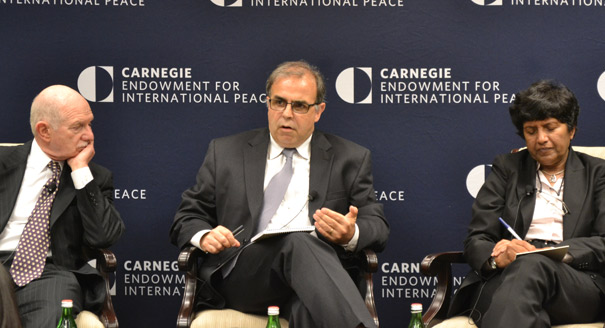Registration
You will receive an email confirming your registration.
Pakistan is currently facing failed negotiations with the Taliban, increased jihadi terrorist attacks in its major cities, and an uncertain presidential transition in neighboring Afghanistan. While these developments have major implications for U.S. policy in the region, they pose near-existential threats to Pakistan, as well as fundamental challenges to the transition in Afghanistan. Samina Ahmed and Mark Schneider of the International Crisis Group introduced a discussion on these challenges and what can be done to address them. Carnegie’s Frederic Grare moderated.
Samina Ahmed
Samina Ahmed oversees International Crisis Group’s work in Pakistan, Afghanistan, India, and Nepal. Her team focuses on political, security, and stability issues in South Asia, including problems of authoritarianism, Islamic extremism, domestic and regional terrorism, international involvement and intervention in the region, and domestic insurgencies and the risk of interstate conflict.
Mark L. Schneider
Mark L. Schneider has been senior vice president at the International Crisis Group since 2001, where he directs the Washington advocacy office. Schneider previously served as the director of the Peace Corps, as assistant administrator of the U.S. Agency for International Development, and as principal deputy assistant secretary of state for human rights and humanitarian affairs.
Frederic Grare
Frederic Grare is senior associate and director of Carnegie’s South Asia Program. He works on India’s Look East policy, on Afghanistan and Pakistan’s regional policies, and on the tension between stability and democratization, including civil-military relations, in Pakistan.
